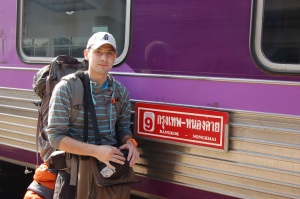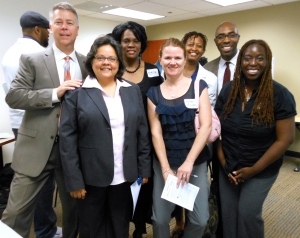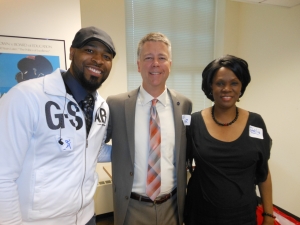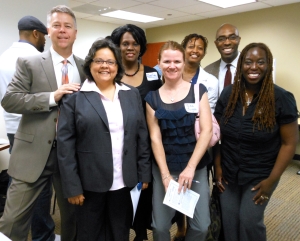January 23, 2012
by Sarah Hellstrom
Special blog post by Ray Abrego III, current Master of Science in Applied Technology(MSAT) student at DePaul University specializing in Information Systems. Ray is an Academic Support Coordinator at Malcolm X College. Check out the volunteer organization he works with at Open Mind Projects…
…

~~~~~~~~
Are you passionate about the integration of technology and education as a means to empower under served communities abroad? Ask how you can integrate a volunteer opportunity abroad into your School of New Learning graduate program!
As an MSAT student and Academic Support Coordinator, I looked for volunteer opportunities that would further develop my personal, academic, and professional areas of practice. I selected Open Mind Projects (openmindprojects.org), which stood apart from other organizations due to their focus on integrating technology and education.
In addition, I was very intrigued by Thai culture, and wanted to immerse myself into this new environment as way to adapt a different mentality to my everyday life.
There were two aspects of my proposed idea that I focused on while volunteering abroad in Thailand and traveling around South East Asia: (1) International Teaching and IT Experience; and (2) Reflection of Practice.
1. International Teaching and IT Experience:
Open Mind Projects (OMP) started off as IT in Isan (est. 2001), an organization determined at bridging the digital divide that many impoverished Thai people face. The goal was to empower the community through increased accessibility of educational support resources, and have local champions expand their support initiatives. They now have numerous projects at various placement sites throughout Lao, Cambodia, Nepal, and Burma.
 At OMP, I gained experience teaching basic PC skills to students in 3rd to 6th grades at Aunban Arunrangsee School in Nongkhai, Thailand. In a conversation with Sven Mauleon (Co-Founder of OMP), he stated to me that it was important for students to find the motivation to learn, then OMP and its’ volunteers could demonstrate the value in pursuing education. OMP focuses on a “Learn by Doing” pedagogical approach and it’s apparent in everything they do. Motivation, Demonstrating Educational Value, and Learn by Doing, are concepts that I will remember as I aspire to become an effective Computer Information Systems (CIS) adjunct faculty member at one of the City Colleges of Chicago (CCC).
At OMP, I gained experience teaching basic PC skills to students in 3rd to 6th grades at Aunban Arunrangsee School in Nongkhai, Thailand. In a conversation with Sven Mauleon (Co-Founder of OMP), he stated to me that it was important for students to find the motivation to learn, then OMP and its’ volunteers could demonstrate the value in pursuing education. OMP focuses on a “Learn by Doing” pedagogical approach and it’s apparent in everything they do. Motivation, Demonstrating Educational Value, and Learn by Doing, are concepts that I will remember as I aspire to become an effective Computer Information Systems (CIS) adjunct faculty member at one of the City Colleges of Chicago (CCC).
The MSAT program focuses on learning how to effectively integrate technology within an organization, and I am extremely honored that I was able to share my knowledge with OMP to help further enhance their operations. I fell in love with Open Mind Projects and wanted to do so much for them, and more importantly the communities they represented.
When I first embarked on this journey, I had ideas of what I wanted to do for OMP. Like any organization, it’s all about the resources (both human and financial), and at times, how to deal with the scarcity of those resources -OMP is no different. I had the opportunity to discuss ways in which we could mobilize OMP Volunteer Alumni for the purposes of fundraising, re-engagement, being informed of current OMP initiatives, promote OMP, and most importantly to continue the relationships established while volunteering. The best way to address these concerns was through their current social network presence via Facebook. I reviewed how we could make changes to their existing questionnaire in an effort to improve volunteer and OMP relations.
After reflecting on my experience, I realized that much of my approach was conducted in the fashion of a system’s analysis, or even a consultant (something Sven M. brought to my attention), for that matter. I say that because prior to moving forward with any idea, I had to gain a larger sense of the organization, and I did this by reviewing volunteer submitted questionnaires, other OMP documents, and asking various questions about OMP operations. I learned the various reasons why volunteer alumni chose OMP and also was able to understand other aspects of their organization. This approach was very much correlated to learning objectives from: IS421- Systems Analysis and Design; ECT 454 – Enterprise Infrastructure; and SNL Special Topics – Social Media.
One of the things that I wanted from this experience was a way make contributions while back home in Chicago. I am currently working on a proposal as to how I will continue to assist in improving their social media presence and will also serve as a US Volunteer Contact and Social Media Advisor for Open Mind Projects.
2. Reflection of Practice: Dealing with Impatience and Control.
In my personal, academic, and professional practices, I often deal with issues of impatience and control, and the negative implications associated to those issues. In Thailand, and through my South East Asia travels, I did not have much control (outside the logistical aspects of things, of course). I did not know the language, fully understand the culture, or was able to exert the normal power I have in my environment here in Chicago – to a certain extent, helpless in some contexts. I welcomed the challenge do deal with my issues of impatience and control, and how feelings of anger, frustration, annoyance, anxiety, and stress play a factor in dealing with those issues.
 In a western society, we often deal with life in a very business oriented way, everything is fast, fast, fast, and we often get consumed by our day-to-day responsibilities. We are often attached to what happened in the past, and what outcomes will happen in the future. We place pressure on ourselves and try to control the various aspects of our lives in order to reach an expected outcome.
In a western society, we often deal with life in a very business oriented way, everything is fast, fast, fast, and we often get consumed by our day-to-day responsibilities. We are often attached to what happened in the past, and what outcomes will happen in the future. We place pressure on ourselves and try to control the various aspects of our lives in order to reach an expected outcome.
At my OMP training site in Nongkhai, Thailand, I immediately learned about the notion of being ‘Jai Ron (Warm Hearted)’ and ‘Jai Yen (Cool Hearted)’.
Jai ron – Warm hearted (not good): easily angered, impatient, irritable, and intolerant.
Jai yen – Cool hearted (good): patient, calm, peaceful, relaxed, and composed.
My experiences abroad have made me aware of the types of situations that bring to surface the negative feelings associated to impatience and control. I learned much about letting things go and finding enjoyment in my environment – to be more ‘Jai Yen’. It is extremely important for me to recognize my emotions, accept them for what they are, understand how they came to be, and then be able to move forward within a given situation without letting those emotions impede my mentality.
~~~~~~~~
 This blog post is dedicated to my Open Mind Projects (OMP) family in Nong Khai, Thailand –
This blog post is dedicated to my Open Mind Projects (OMP) family in Nong Khai, Thailand –
Sven, Toto, Pai, Prom, Joy, Kai, Best and Moss -thank you for the invaluable experience.
Interested in Volunteering in Thailand, Lao, Cambodia, Burma, and/or Nepal?
Check out Open Mind Projects’ Website…






































